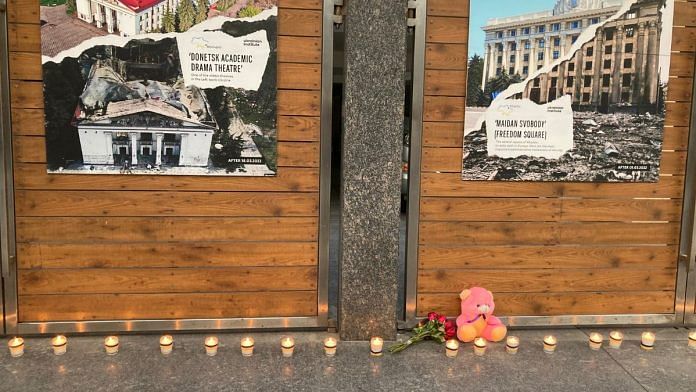New Delhi: When Swedish-Ukrainian poet Eugene Wolynsky performed in New Delhi to commemorate the two-year anniversary of the war in Ukraine, he invoked Varanasi’s Manikarnika ghat, Kapilavastu and Dharma.
There is more in common between the two democracies than many know, he said.
India and Ukraine are surrounded by authoritarian regimes and must hold on together, declared Wolynsky to an audience of about 30 people at the embassy of Ukraine in India on 24 February.
For Wolynsky, poetry is the method of combating the Russian information war since the annexation of Crimea a decade ago.
“In the last 10 years, my war has been an information war. I bring the world to Ukraine and I bring Ukraine to the world. I bring Ukraine to India and India to Ukraine – for me it is a common world,” Wolynsky told ThePrint after his performance.
On the night of 26 February 2014, Russian forces seized the Crimean Peninsula from Ukraine and a few weeks later annexed the territory after holding a referendum. The occupation of Crimea marks the beginning of the war between Russia and Ukraine.
Russia president Vladimir Putin announced a “special military operation” against Ukraine on 24 February 2022– marking the beginning of a full-scale invasion of the country.
To observe the anniversary of the war, members of the Ukrainian diaspora in India spent an evening listening to Wolynsky’s poetry that borrows heavily from Indian folklore adapted to Ukrainian settings.
“I want us [India and Ukraine] to be together. In my perception, the two worlds are the same– the world of Dharma and the eternal liberation of the spirit – we are sharing the same tradition. The more we understand this, it makes us both stronger,” said Wolynsky. He shared a poem with the audience titled the ‘Manikarnika Swimming School’, which focused on swimming across the banks of the Ganga from the Manikarnika ghat in Varanasi, Uttar Pradesh.
Also read: Even Tomars and Mughals dumped waste in the Yamuna—Swapna Liddle on Delhi’s water history
Dnipro to Ganga
For Wolynsky, the histories of India and Ukraine share many similarities and are reflected in his poetry. On Saturday, he affirmed his belief– “If you look historically, the 17th century is heroic for both India and Ukraine. The Cossacks were fighting the Ottomans in Ukraine, and the Rajputs were fighting the Mughals in India,” said Wolynsky.
However, the modern symbol for Ukraine, according to Wolynsky, is Siddhartha Gautama (Buddha) and the history of Kapilavastu. “Siddhartha is a necessary symbol for Ukraine today. As a leader of Kapilavastu, he was a symbol for the anti-authoritarian movement at that time. He fought corruption. I try to put these stories together,” Wolynsky explained.
His poetry delves into the stories of the two culturally significant rivers in Ukraine and India – the Dnipro and the Ganga. The Dnipro is a 2,200-kilometre-long river that stretches from Russia to the Black Sea through Belarus and Ukraine.
“When I swim in the Dnipro and when I swim in the Ganga, by touch they feel almost the same. The two rivers are very similar,” Wolynsky said, highlighting his inspirations for the poem.
Before Wolynsky’s performance, the event at the embassy began with a Ukrainian folk song played as a requiem for those who have died in Ukraine since the Euromaidan protests in 2013-2014.
Titled ‘A duckling swims in the Tisza’, the song is a conversation between a soldier and his mother before he leaves for war. It has found frequent use in recent years in Ukraine, especially as a mark of respect for the dead.
(Edited by Ratan Priya)



